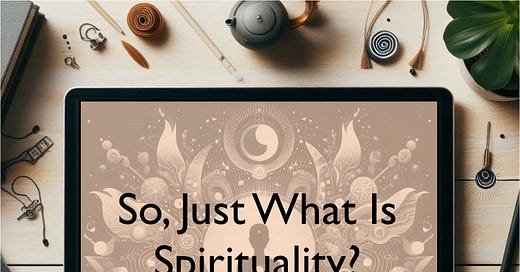So, Just What Is Spirituality? (Part II)
Words dissemble, Words be quick, Words resemble walking sticks
Seven years after Jim Morrison’s death, his Doors bandmates released An American Prayer, an album of his poetry. Though it received mixed reviews, the work deeply influenced me—particularly these lines from Curses, Invocations:
“Words dissemble,
Words be quick,
Words resemble walking sticks.
Plant them, they will grow,
Watch them waver so.”[i]
Morrison captures the paradox of language: words appear rigid yet their meanings are fragile—rising, swaying left and right, or withering over time.
Take the word radical. Once meaning “root,” it now implies “extreme” or “dangerous.” A radical person was once seen as being grounded; now it means being outside of the mainstream. Similarly, the definitions of spirituality and spiritual have shifted dramatically in just 50–60 years. This changing of meaning is important, especially as spirituality gains in popularity among healthcare researchers and the public. A quick Google search reveals millions of query results, and a PubMed graph shows the growing interest among researchers.
In Part I, I described leading a Spirituality Group at a VA hospital, where most Veterans identified as SBNR (Spiritual, But Not Religious)[ii]—the fastest-growing belief group in the United States. Unlike atheists or agnostics, SBNRs often believe in a higher power (God, angels, miracles) but reject organized religion.
The Transcendent Roots of Spirituality
Historically, spirituality belonged to religious discourse.[iii] To be “spiritual” meant devotion to G-d—in Christianity, it might mean being “filled with the Holy Spirit” or “in the world but not of it.”[iv] Until the 21st century, spiritual and religious were rarely divorced; both pointed to the sacred or transcendent.
Harold Koenig (Duke University) underscores this association:
“Spirituality is distinguished from its consequences – human values, morals, meaning, purpose, peace, connectedness to others, feelings of awe and wonder – by its link to the transcendent. The transcendent is that which is outside of the self, and yet also within the self – and in Western traditions is called God, Allah, HaShem, or a Higher Power, and in Eastern traditions is called Ultimate Truth or Reality, Vishnu, Krishna, or Buddha.”[v]
Peter Hill and Ken Pargament agree:
“Central to religion and spirituality is a sense of the sacred. It is this sense that makes the study of religion and spirituality distinctive from other areas of study.”[vi]
The Modern Shift: From The Sacred to The Self
In the early 2000s, psychologists and healthcare researchers began redefining spirituality to fit wellness and mental health frameworks. A widely accepted consensus definition states:
“Spirituality is the aspect of humanity that refers to the way individuals seek and express meaning and purpose, and the way they experience their connectedness to the moment, to self, to others, to nature and to the significant or sacred.’ This definition underscores the universality of spirituality.”[vii]
Notice the word sacred is last. This “universal” definition prioritizes mental health processes (meaning-making, purpose, belonging) over transcendence. While adopted by many professional spiritual care groups, the consensus definition risks reducing spirituality to self-help with a mystical veneer.
Three Interesting Non-Academic Definitions
In popular literature, several writers have been very helpful in the evolving dialogue around spirituality. Below are three such definitions that have assisted me in my own understanding:
Brené Brown (The Gifts of Imperfection):
“Spirituality is recognizing and celebrating that we are all inextricably connected to each other by a power greater than all of us, and that our connection to that power and to one another is grounded in love and compassion. Practicing spirituality brings a sense of perspective, meaning, and purpose to our lives.”[viii]
Strengths: Universal, inclusive.
Weaknesses: “Greater power” could mean anything; leans into material outcomes.
Letty Russell (Feminist theologian, Church in the Round):
“I describe spirituality as the practice of bodily, social, political and personal connectedness so that life comes together in a way that both transcends and includes the bits and pieces that make up our search for wholeness, freedom, relationality, and full human dignity.”[ix]
Strengths: Centers community and liberation.
Weaknesses: Vague on the transcendent.
Graham Jones (Socialist, Red Enlightenment):
“[Spirituality is] the interrelation of metaphysics, ethics, and embodiment. That is, [spirituality is] an understanding of the unseen, ideas of how to act both momentarily and in one's long-term path, and the internal feelings and external actions of the body. Each exists in fragmentary, lower-intensity form in all conscious experience, and distinct 'spiritual experiences' emerge with greater attention to and synchronization of these facets.”[x]
Strengths: Bridges the material and mystical; unexpected depth from a skeptic.
Weaknesses: Risks reducing spirituality to a form of psychology.
My Definition
Now that I have introduced the dilemma of defining spirituality, I would like to propose one that is uncompromising, yet inclusive and universal. While I am not naïve enough to believe that my definition is the end all, I propose that:
“Spirituality is how individuals and groups seek and experience their relationship to the transcendent, with one another and the cosmos. Spirituality encompasses beliefs and practices that center the sacred relationship, even as we are shaped by—and shape—cultural, social, economic, and political life.”
As you can see, my definition keeps the focus on the transcendent while grounding spirituality in the real-world. If a definition weakens the sacred, it risks minimizing what is most missing in many people’s lives. Walking in nature or mindful breathing may foster well-being, but unless these experiences are based in the sacred as fundamental, they are not inherently spiritual.
A Call to Dialogue
How do you define spirituality? What influences your view? Could it transform individuals—or the world? Share your thoughts, and join me in Part III, where I’ll discuss Spiritual Health.






In theology, I'm on board with this definition: "The quality of a person who, opposed to materialism and secularism, seeks to live within the circumstances of God's providence according to His Will." (Found in the 1956 Maryknoll Catholic Dictionary.)